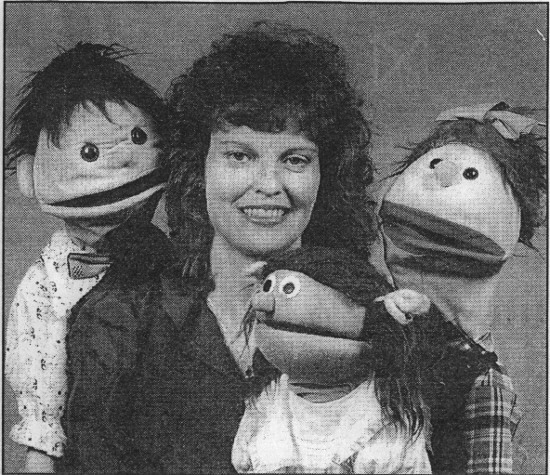This newspaper story appeared in the Community Courier newspaper (Hershey, PA) on July 22, 1998 about some of the work we have done. The desire to do this article was inspired by the receipt of the grant from Ronald McDonald House Charities for us to do Pediatric Puppet Comfort Therapy.
Puppets Aid Pediatric Therapy At Hershey Medical Center
by Beci Avers

When Lynn Somers of Ephrata was eight years old, she loved to entertain her younger brother with puppet shows. She says she can remember putting on shows for him in the back of the car on long family car trips. “Not only was I entertaining him, but I was also entertaining half of the highway,” Somers recalls.
During one of her college courses, Somers used puppets in one of her speeches to entertain her peers and her professor, who was very impressed with her skill. Since then, Lynn has been using puppets to minister to others and to give testimonials. Eventually she developed Hand of the Master Ministries, Inc.
Somers believes that using puppets allows her to get away with discussing certain topics that may seem controversial or taboo, especially in the church. But as people are watching, they become so enthralled with the puppets themselves that the audience doesn’t really pick up on the message the puppets are sending until after the fact, which makes the audience members think. Because the messages are coming from a puppet. not a person, the audience is more forgiving.
“I am often able to challenge the church through my programs, especially when the congregation is fighting about something silly. Sometimes the message that the program sends makes people think about their church life, said Somers.
Using the puppets to minister to churches and Bible schools has become the primary focus of Lynn and her husband Frederick, who holds a Master of Divinity Degree from United Theological Seminary in Dayton, Ohio, but they felt that their puppeteering could be used in other ways to benefit people in the community. “We are always looking for other ways to use the puppets to share our messages, said Lynn.
For that reason, Lynn and Frederick attended a workshop that was hosted by a puppet company about hospital and pediatric therapy to help children who are under-going surgery or dealing with a chronic illness. “We went to the seminar and received a lot of training about using the puppets in therapy. We got really excited about doing this kind of work. At the seminar the company introduced a special hospital puppet, dressed in scrubs and with a stethoscope, which is used primarily for rehabilitation purposes. We ended up purchasing that puppet because we knew we wanted to do this,” said Somers.
With a twinkle in her eye and good intentions in her heart, Lynn approached her local hospital about using the puppets in the therapy department. Unfortunately, staff members told her that those types of services wouldn’t be necessary because the number of children who come to the hospital was low. “They advised Lynn to contact a larger medical facility. With that in mind, she headed to Hershey.
“When I first came to Hershey Medical Center, my goal was to visit with patients and help them during their post-operation recovery. Once again I was sold that the puppets wouldn’t be practical. However, someone told me to talk to someone in pediatric rehabilitation, which is a separate part of the hospital. After I gave my proposal to the staff at the rehabilitation center they decided that it might be something they want to try,” said Lynn.
“The next step was trying to find funding for the puppet therapy. I began looking for grants and foundations that would be able to help. After completing applications and undergoing reviews from different organizations, we received money from the Ronald McDonald House Charities (RMHC),” she added.
Somers said that during the time when representatives from RMHC came to see the puppet therapv, her husband Frederick had just made a breakthrough with a five-year old child who had his limbs amputated. Hospital staff members saw the way that the puppet was able to affect the life of that child and that the puppet therapy was something the rehabilitation program needed.
“When the representatives came to the hospital, staff members were able to tell them that the therapy really works because they had seen the progress we made with one child,” said Lynn.
Lynn and Frederick continue to minister to churches throughout the United States with their puppets, but Lynn dedicates Thursday of every week to the medical center. She says sometimes works individually with a child and other times she joins the child’s therapy session and does all of things that the child does. Although Lynn and her puppets have a strong orientation to preaching, when she is working in the hospital it is simply to be there for the patients and to interact with them.
“We are doing what Jesus would do, and that is to simply be present,” said Lynn.
